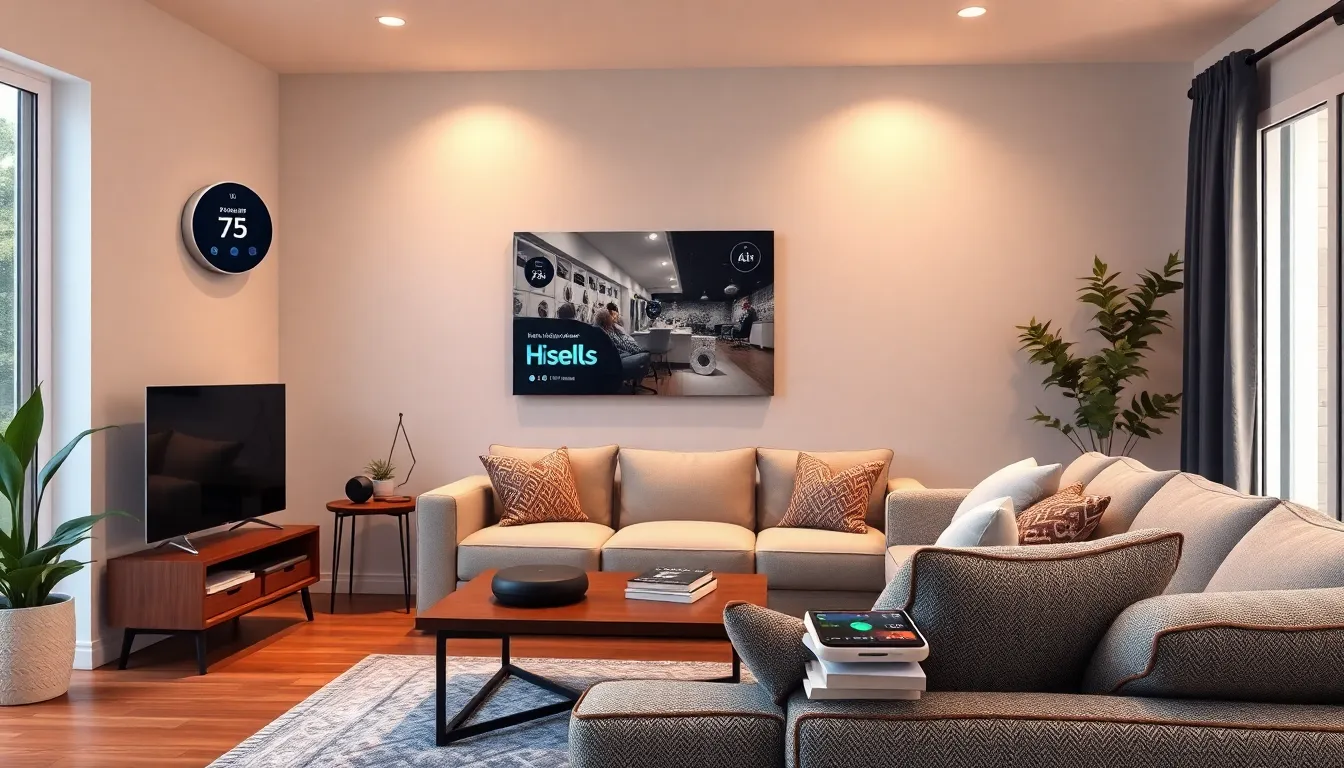In a world where your toaster might soon outsmart you, AI-driven devices are taking center stage. These gadgets don’t just make life easier; they add a sprinkle of futuristic flair to everyday tasks. Imagine a smart fridge that not only reminds you to buy milk but also judges your late-night snack choices. It’s like having a tech-savvy roommate who’s always got your back—or your snacks.
From voice assistants that understand your every whim to robots that can vacuum your floors while you binge-watch your favorite show, AI is transforming how we live, work, and play. The future is here, and it’s not just smart; it’s downright entertaining. Buckle up as we dive into the fascinating world of AI-driven devices and discover how they’re revolutionizing our lives, one quirky gadget at a time.
Table of Contents
ToggleOverview of AI-Driven Devices
AI-driven devices represent a significant advancement in technology, integrating artificial intelligence to enhance user experiences. Smart home gadgets like thermostats learn user habits and adjust temperatures accordingly, promoting energy efficiency. In healthcare settings, AI monitors patients’ vital signs, providing real-time data to medical professionals.
Innovations in personal assistants, such as Amazon Alexa or Google Assistant, allow users to control various aspects of their environment through voice commands. Voice recognition technology continuously evolves, improving interaction quality and making tasks more accessible.
Robotic vacuum cleaners autonomously navigate rooms, detecting obstacles while efficiently cleaning floors. Smart security systems use AI to identify potential risks, alerting homeowners and reducing response times.
Home appliances such as refrigerators become intelligent by managing food inventories. Some systems suggest recipes based on available ingredients, aiding meal preparation. These devices not only simplify chores but also encourage healthier food choices.
Wearable tech, including smartwatches, tracks fitness levels, offers health insights, and connects seamlessly to smartphones. As these devices gather data, they’re able to adapt to users’ lifestyle changes, enhancing personal health management.
AI-driven devices illustrate the fusion of technology and daily life, redefining convenience. Their emerging presence continues fostering new possibilities, indicating a promising future for AI integration in diverse fields.
Types of AI-Driven Devices

AI-driven devices manifest in various forms, enhancing everyday experiences. Each type serves specific purposes within homes and personal routines.
Smart Home Devices
Smart home devices revolutionize household management. Devices like intelligent thermostats adjust temperatures based on user behavior, maximizing energy efficiency. Smart fridges track inventory, suggest recipes, and remind users when supplies run low. Security systems employ AI to analyze real-time data, identifying unusual activity and alerting homeowners. Voice assistants facilitate seamless control, allowing users to manage different aspects of their homes effortlessly.
Wearable Technology
Wearable technology plays a vital role in personal health and fitness. Smartwatches monitor heart rates, sleep patterns, and physical activity, empowering users to make informed decisions. Devices like fitness trackers adapt to individual routines, providing insights to motivate progress. Wearable tech integrates with mobile applications, ensuring users receive personalized feedback and support. As innovations continue, these devices evolve, offering enhanced features for lifestyle management and health awareness.
Benefits of AI-Driven Devices
AI-driven devices provide numerous advantages that enhance daily life. Users experience increased convenience, efficiency, and satisfaction through smart technology.
Enhanced Efficiency
AI-driven devices streamline everyday tasks. Smart thermostats adjust temperatures automatically based on user behavior, significantly reducing energy consumption. Robotic vacuums autonomously clean floors, giving users more free time. Additionally, AI systems in home appliances manage inventory, preventing food waste by keeping track of expiration dates. AI technology continuously analyzes user habits to improve overall functionality and help save time.
Improved User Experience
Enhanced interaction defines the user experience with AI-driven devices. Voice assistants respond to commands quickly, allowing hands-free control of the environment. Personalized feedback on health and wellness from wearable devices motivates users to reach fitness goals. Smart appliances also learn preferences, ensuring they meet specific needs effectively. This customization fosters deeper engagement, making daily routines more enjoyable and efficient, which ultimately benefits users’ lifestyles.
Challenges and Concerns
AI-driven devices present several challenges and concerns that warrant consideration. One major issue involves privacy.
Privacy Issues
Personal data collection raises significant privacy concerns. AI devices often gather extensive information about user behavior and preferences. This data can lead to potential misuse, such as unauthorized access or sharing with third parties. Users frequently find it difficult to understand data usage policies, which increases distrust in these technologies. Studies indicate that 79% of consumers express worry about how their data is managed by AI systems. Maintaining transparency in data processing remains crucial for fostering user confidence.
Reliability and Dependability
Additionally, the reliability and dependability of AI-driven devices come into question. Reliability issues arise if devices fail to perform as intended or make erroneous decisions. For example, misinterpretations by voice assistants can lead to frustration. Research shows that 30% of users experience dissatisfaction with inaccurate responses. Dependability becomes critical in sectors like healthcare, where real-time data is vital for patient safety. The integration of robust testing and quality assurance processes is essential for ensuring that these devices live up to user expectations.
Future Trends in AI-Driven Devices
Advancements in AI-driven devices show significant promise for the coming years. Predictive algorithms enhance user experiences, providing tailored suggestions and smarter interactions. Emerging technologies, like machine learning and natural language processing, empower devices to understand complex commands and anticipate user needs effectively.
Integration with the Internet of Things (IoT) expands the capabilities of home and wearable tech. Devices will communicate with one another in real-time, enabling seamless control over various systems. Cooperative capabilities allow AI systems to operate collectively, improving efficiency and convenience.
The healthcare sector will see transformative changes through AI diagnostics and monitoring. Continuous advancements in data analytics lead to more precise health assessments. Wearable devices will increasingly provide immediate health feedback and alerts, fostering proactive healthcare management.
Smart home ecosystems will evolve to become more intuitive and responsive. Enhanced security features, powered by AI, will recognize unusual behaviors and alert homeowners instantly. Home automation is set to expand, with devices learning user preferences for optimal comfort and energy usage.
Sustainability concerns drive innovations in energy efficiency. AI-managed devices will optimize energy consumption based on real-time data analysis, significantly reducing waste. These improvements not only lower costs but also contribute to a greener future.
Moreover, user acceptance and trust remain pivotal for widespread adoption. Transparency in data practices will shape user confidence in AI-driven technology. Focusing on ethical considerations ensures that privacy concerns are addressed, allowing users to feel secure with their devices.
The future of AI-driven devices hinges on enhanced communication, intelligent automation, and a commitment to ethical practices. These trends pave the road toward a more integrated and efficient digital landscape.
AI-driven devices are reshaping daily life in remarkable ways. Their ability to simplify tasks and enhance user experiences is undeniable. As these technologies continue to evolve they promise even greater integration and efficiency in homes and personal health management.
The focus on user trust and data privacy will play a crucial role in their acceptance. With advancements in AI and IoT the future holds exciting possibilities for smarter homes and healthier lifestyles. Embracing these innovations could lead to a more connected and efficient world where technology truly complements human needs.





